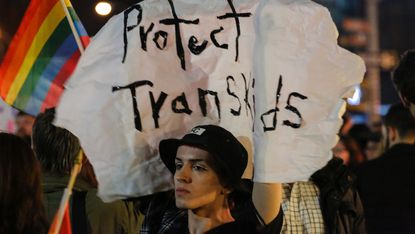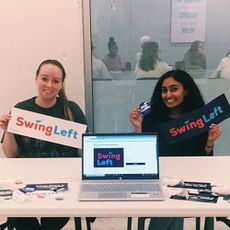That Anti-Trans Ballot Measure in Massachusetts Was Defeated
In Massachusetts in November, citizens will vote on whether the state's trans citizens should be afforded equal rights—rights that were already signed into law by the state's governor in late 2016.


Update: Good news—Massachusetts voted "Yes" on 3, meaning that the anti-trans ballot measure failed and the existing law to protect trans citizens in public places remains.
In Massachusetts in November, citizens will vote on whether the state's trans citizens should be afforded equal rights—rights that were already signed into law by the state's governor in late 2016. Then, the state passed Senate Bill 2407, which protected trans citizens from discrimination in public places, like restrooms. Heralded as a landmark victory for civil rights activists in the state, a single measure on the upcoming November 6 ballot—Massachusetts' Gender Identity Anti-Discrimination Veto Referendum—would undo all of it.
Both the ACLU and the Freedom For All Massachusetts campaign are fervently fighting what's known in the state as Question 3, which will see residents of Massachusetts voting "YES" or "NO" on the ballot. (By answering "YES," residents will vote to uphold the existing law that protects the state's trans citizens; if they answer "NO," they'll vote to eliminate it.) The idea is that the changes wrought by the state's anti-discrimination bill are jeopardizing non-trans citizens' safety, which is utterly false, according to a UCLA study.
ACLU attorney and activist Chase Strangio wrote on Twitter: "I am horrified and disheartened." Strangio linked the uptick of anti-civil rights measures and legislation like that of Massachusetts to the advent of Trump's administration, adding: "In Massachusetts, a ballot measure that is literally aimed at erasing trans people from public life is getting no attention. State legislatures are gearing up across the country to attack us. And no one is watching."
In a June poll conducted by the Suffolk Research Center, a significant number of citizens indicated that they were likely to vote "NO" on the poll, thus risking the 2016 law being repeated. With 49 percent of those polled saying they would vote "YES," other respondents said they were either undecided or preparing to vote against the law.
It's been suggested by the Boston Globe and others that the wording on the ballot is part of the issue, and that voters may well be confused about what "YES" and "NO" in these instances mean for the law, exactly. This has prompted the Freedom For All Massachusetts campaign to coin the phrase "YES on 3," which aims to simplify the process—if you support trans rights, just vote "YES" on Question 3.
As Strangio suggests, the measure is one of many designed to strip away the progress made towards LGBTQ rights in the last several years. Just yesterday, the Trump administration announced its intent to refuse U.S. visas to same-sex partners of diplomats, essentially forcing them to live apart, assuming the partner does not have a valid visa, until or unless they marry.
Stay In The Know
Get exclusive access to fashion and beauty trends, hot-off-the-press celebrity news, and more.
Whether you're in in Massachusetts or otherwise, you can learn about how to fight the ballot measure here.

From explainers to essays, cheat sheets to candidate analysis, we're breaking down exactly what you need to know about this year's midterms. Visit Marie Claire's Midterms Guide for more.
RELATED STORIES



Jenny is the Digital Director at Marie Claire. A graduate of Leeds University, and a native of London, she moved to New York in 2012 to attend the Columbia University Graduate School of Journalism. She was the first intern at Bustle when it launched in 2013 and spent five years building out its news and politics department. In 2018 she joined Marie Claire, where she held the roles of Deputy Digital Editor and Director of Content Strategy before becoming Digital Director. Working closely with Marie Claire's exceptional editorial, audience, commercial, and e-commerce teams, Jenny oversees the brand's digital arm, with an emphasis on driving readership. When she isn't editing or knee-deep in Google Analytics, you can find Jenny writing about television, celebrities, her lifelong hate of umbrellas, or (most likely) her dog, Captain. In her spare time, she writes fiction: her first novel, the thriller EVERYONE WHO CAN FORGIVE ME IS DEAD, was published with Minotaur Books (UK) and Little, Brown (US) in February 2024 and became a USA Today bestseller. She has also written extensively about developmental coordination disorder, or dyspraxia, which she was diagnosed with when she was nine.
-
 Prince Andrew's Business Advisor Accused of Being a "Spy" and Banned From the U.K.
Prince Andrew's Business Advisor Accused of Being a "Spy" and Banned From the U.K."We found a way to get the relevant people unnoticed in and out of the house in Windsor."
By Amy Mackelden Published
-
 Kate Middleton Allegedly Rejected Idea to Seat Prince Andrew "Behind a Pillar" at Her Christmas Carol Concert
Kate Middleton Allegedly Rejected Idea to Seat Prince Andrew "Behind a Pillar" at Her Christmas Carol Concert"Although very much a family affair... there was no space for Uncle Andy."
By Amy Mackelden Published
-
 32 Celebrities Who Got Their Start on Reality TV
32 Celebrities Who Got Their Start on Reality TVBelieve it or not.
By Iris Goldsztajn Published
-
 36 Ways Women Still Aren't Equal to Men
36 Ways Women Still Aren't Equal to MenIt's just one of the many ways women still aren't equal to men.
By Brooke Knappenberger Last updated
-
 How New York's First Female Governor Plans to Fight for Women If Reelected
How New York's First Female Governor Plans to Fight for Women If ReelectedKathy Hochul twice came to power because men resigned amid sexual harassment scandals. Here, how she's leading differently.
By Emily Tisch Sussman Last updated
-
 Why the 2022 Midterm Elections Are So Critical
Why the 2022 Midterm Elections Are So CriticalAs we blaze through a highly charged midterm election season, Swing Left Executive Director Yasmin Radjy highlights rising stars who are fighting for women’s rights.
By Tanya Benedicto Klich Published
-
 Tammy Duckworth: 'I’m Mad as Hell' About the Lack of Federal Action on Gun Safety
Tammy Duckworth: 'I’m Mad as Hell' About the Lack of Federal Action on Gun SafetyThe Illinois Senator won't let the memory of the Highland Park shooting just fade away.
By Sen. Tammy Duckworth Published
-
 This Bill Wants to Stop Anti-Abortion Groups From Getting Your Private Data. Period
This Bill Wants to Stop Anti-Abortion Groups From Getting Your Private Data. PeriodPost-Roe period tracking apps and search history suddenly have serious implications.
By Emily Tisch Sussman Published
-
 Post-Roe, Pregnant People Will Become Suspects
Post-Roe, Pregnant People Will Become Suspects“We anticipate a very dramatic increase in the rate of criminalization of all pregnancy outcomes.”
By Lorena O'Neil Last updated
-
 14 Abortion Rights Organizations Accepting Donations to Support Their Fight
14 Abortion Rights Organizations Accepting Donations to Support Their Fight'Roe' is no longer the law of the land, but these organizations won't stop fighting.
By Gabrielle Ulubay Published
-
 Lawmakers, Activists, and Allies Are Reacting With Fury to 'Roe' Being Overturned
Lawmakers, Activists, and Allies Are Reacting With Fury to 'Roe' Being OverturnedThousands are taking to Twitter to express their grief and anger.
By Tanya Benedicto Klich Published